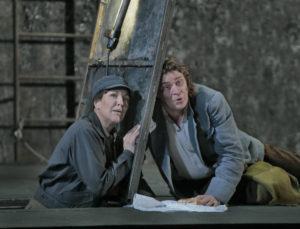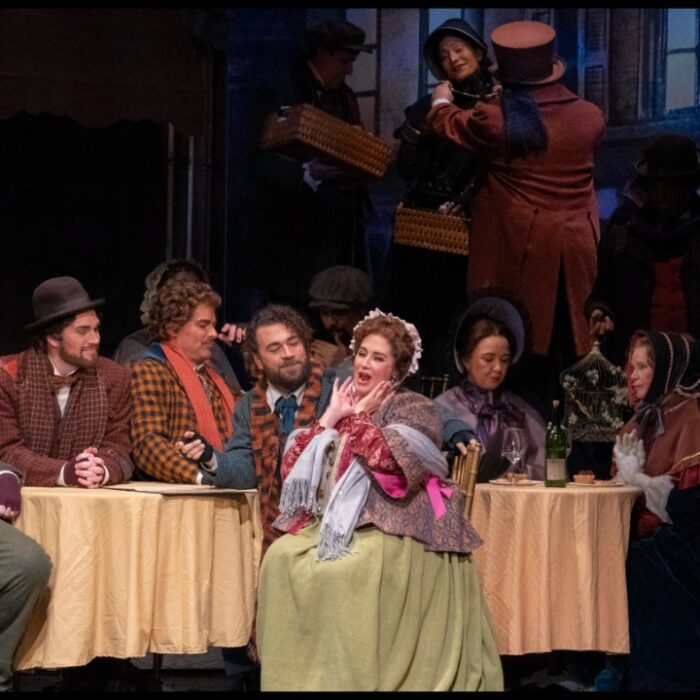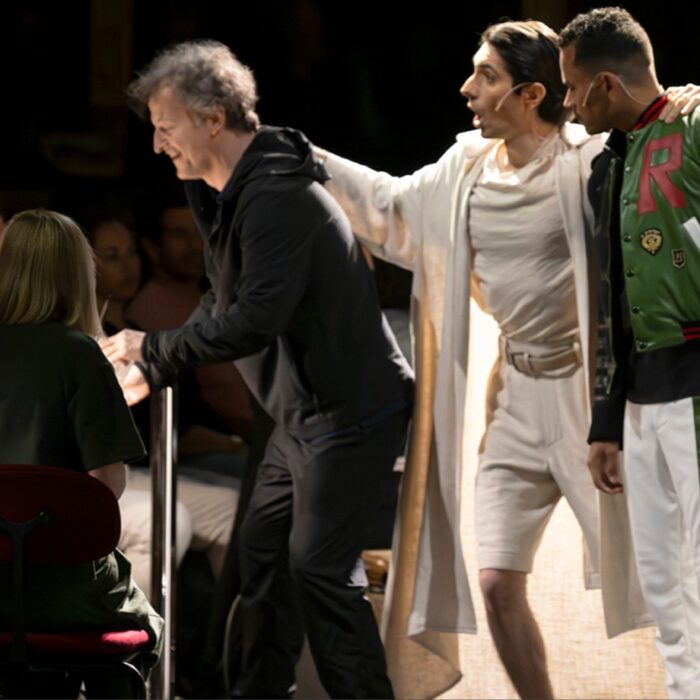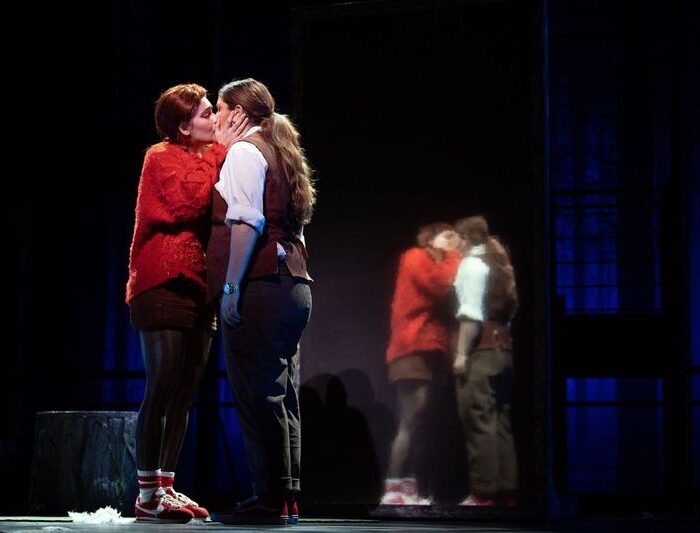
Metropolitan Opera Review 2016-17 – Fidelio: Beethoven’s Ode to Women Celebrated With Stunning Cast & Production
By David SalazarI preface this by stating that this review is for the performance on March 24, 2017. I would also like to recognize that this is just one, performance of a seven-performance run. In an ideal situation, I would attend every performance and write a detailed review of the overall work. As it stands, I can only go on my perspective of one performance.
2017 has been the year of the women. Amidst the tremendous political turmoil, women stood up for their rights in late January, pushing forth a march around the United States that fueled and inspired others around the world.
It is thus fitting that the Metropolitan Opera has brought its audiences the opera that celebrates their greatness and heroism. Beethoven’s “Fidelio” for all of its dramatic flaws is without any doubt this very ode to the power that a woman can exert when she sets her mind to accomplishing any goal, no matter how dangerous or challenging.
Women Adding Color to ‘Fidelio’s’ Dreary World
Jurgen Flimm’s production, which turned 17 this year, embraces this central theme with solid results. As the world opens up at the end of the opera, the prison walls knocked away, we are greeted with a chorus of men dressed in lifeless whites and grays. Suddenly the color palette shifts, a wide range of brighter colors enter the stage – women breaking the visual mold that the opera has established for nearly two hours. Up to this point, only Marzelline has protested this rigid color palette wearing red once she is allowed to fully embrace her true feelings, but its meaning isn’t fully clear until the very end of the work when the other women parade onto the set.
A ‘Fidelio’ Without Gender Stereotypes
Flimm, who was brought back to direct the production, keeps the drama’s pace healthy and fluid, but perhaps his greatest achievement came in collaboration with his leading lady Adrianne Pieczonka. Leonore disguises herself as a man, Fidelio, to gain access to the prison where her husband Florestan is being locked up. Whereas many actresses might play up the “manliness” of Fidelio to later contrast it with a more “delicate” Leonore, Pieczonka avoids the mannerisms altogether. With the exception of some darkening of her voice, her overall portrayal remained consistent, her Leonora and Fidelio displaying the same physically and general attitude even after the revelation of her true identity. What we end up with is the realization that Leonora was always acting as herself, it was others who chose to ignore this fact and label and identify her as they saw fit. She played along with it for a bit to get what she wanted, but eventually, in the moment of highest danger asserted herself as the person she truly was. Eschewing any attempts to act like a “man” strengthen the portrayal and essentially destroy any preconceived notions of gender stereotypes, the true assertion of women’s power that this opera demonstrates.
Vocally she was at her absolute best, giving a nuanced portrayal of a woman finding her way through dark moments. Her famous monologue “Abscheulicher, wo eilst du him?” faced Leonore with her first doubts into finding her beloved husband. As the aria initiated, Pieczonka’s voice retained a quieter tone, expressing Leonore’s trepidation. But as the vocal line developed and Leonore’s resolution grew, Pieczonka’s voice beamed through the orchestra in exultation as she proclaims unwavering strength in the face of her challenge to save her beloved. Moments after her aria, she raced off to free all the prisoners besides her.
Her most potent dramatic moment came at the opera’s climax. With Florestan facing murder at the hands of Pizarro, Pieczonka’s Leonore jumped in front of him, her voice booming through the theater as she revealed her identity. Even when Greer Grimley’s Pizarro tried to move her aside, she stood her ground, her voice even stronger in her next lines. Throughout the ensuing duet with Florestan, Pieczonka, and tenor Klaus Florian Vogt matched one another vocally, expressing their equality and true love for one another. And yet, the staging had her kneel beside her faltering husband, prop him up and help him stand as the musical segment drew to its climax. At the grand finale, Pieczonka sang her final triumphant vocal lines while hoisted in the air by others, a final display of courage and vocal prowess.
An Entire Character Arc in Just One Note
Florestan has been described as the “Harry Lime” of opera (after the famous Orson Welles character in “The Third Man”) showing up halfway through the opera after being mentioned throughout the first act. This build-up of dramatic curiosity gets its payoff with some of the most glorious music Beethoven ever wrote, but it demands a tenor of true greatness to really deliver on the composer’s musical promise. Klaus Florian Vogt’s vocal timbre has been described as sweet and delicate, but this is only half-true. What people also fail to mention is the immense power that is coupled with that unique timbre. He might “sound” like a lyric tenor, but his voice is right there with the most towering of heldentenors. His delivery of the opening “Gott,” a sublime crescendo on a single note that expressed the entirety of Florestan’s character arc, was riveting. As he lay on the floor, his voice started from virtually nothing, the crescendo growing so massive that it engulfed the massive Met Opera auditorium in an emotional call for help. From there the tenor’s singing took on a murky and mournful quality as he bemoaned his fate, the power withdrew to emphasize Florestan’s frailty and defeat. But then suddenly, at the aria’s turning point, Vogt’s voice found another gear, its resplendent sound echoing yet again with heft before the tenor collapsed in his final moments from exhaustion. The trio saw him take full advantage of his delicate timbre to express his humble thanks to Leonore’s kindness, his phrasing filled with a gloriously fluid legato that isn’t always a signature of this voice type. As noted, his singing during the euphoric duet with Pieczonka was marked by an exactness in the vocal unity between the two partners, the two showing their vocal potency and dexterity throughout the challenging passages.
A Dynamic Dramatic Duo
Rocco and Pizarro’s conflict in the opera is far more dynamic that most may realize, both men representing the moral conflict at the core of the opera. This was rather clear thanks to two fantastically specific portrayals of the characters. Falk Struckmann’s Rocco was lovable from start to finish, his voice retaining a leisurely and graceful quality throughout the opening stages of the opera. His aria “Hat man nicht auch Gold beineben” characterized by a bounciness in his voice. He was equally gentle in the opera’s opening quartet and subsequent trio. And when faced with the demands of murdering Florestan, he stood his ground, his voice taking on a rigid tone. Yet there was always vocal beauty and clarity throughout, a constant reminder that this man was, despite his questionable actions, a loving father.
In contrast, Greer Grimsley had no concern for vocal “beauty” in the traditional sense. He sang with precision and firmness, but his voice had a rougher and coarser edge, particularly throughout his opening aria, his sound blasting through Beethoven’s explosive orchestration. His violent attacks on syllables painted his Pizarro as a violent man, who even as he was carried away, was not ready to give up his fight.
What Falling in Love Sounds Like
Soprano Hanna-Elisabeth Müller made her debut at the Met this season, and on account of her turn as Marzelline, she could be primed for a solid career with the company. As the opera opens, she is being pursued by the jail assistant Jaquino (David Portillo) despite having absolutely no interest in him. Throughout this sequence, her voice retained a sharp and pointed sound emphasizing her disdain. It wasn’t until her ensuing aria, “O wär ich schon mit dir vereint,” that we truly heard the sweetness and polish of her phrasing. Beethoven’s music for this aria is filled with rising vocal lines, expressing the euphoria of young love. Müller’s voice soared in these passages, the explosion of bright sound encapsulating the highs of hopeful love. Coupled with the caressing winds, you could really feel the power of love taking flight, a musical freedom that only Beethoven could achieve. At the climactic “Lust,” she expended all of her vocal might, bringing tremendous energy to the briefest of pauses. To cap it all off, Müller sang the final lines with the utmost tenderness, stretching out the phrase in a way few others dare to do, the final lingering final notes leaving a lasting impact on the listener. Her singing was the ultimate encapsulation of what it feels like to fall head-over-heels in love. The rest of her performance in the quartet, trio and finale was filled with this vocal nuance, but it was this aria that made her a true winner.
If there was any gripe with her Marzelline (and in reality, it wasn’t really her fault), it would come down to the opera’s final moments. The opera’s libretto leaves the Marzelline-Fidelio-Jaquino love triangle completely unresolved with the young girl left with only one line to express her disappointment. Faced with this unfinished plot thread, Flimm opted for emphasizing her bitterness during the opera’s final chorus while Jaquino tried to win her back. The moment was filled with so much disappointment that it became a massive detractor from the euphoria taking place around them. In fact, given the fact that there was dramatic tension involved in these exchanges between Jacquino and Marzelline, it was impossible not throw all of my attention on this development, despite my trying to ignore it altogether. It was nice of Flimm to try and tie up loose ends, but not at the expense of one of opera’s most sublime celebrations.
Unsung Heroes
As Jacquino, David Portillo’s smooth and silky tenor gave the opera a lightness essential to its opening moments. His failed attempts at flirting in the opera’s opening duet provided the production with its only true humor. And while Jaquino gets relegated to the background after the opening scenes of the opera, he still managed to imbue Jaquino with complexity and interest. During the Act 4 quartet, he walked in with a massive bouquet of roses, only to be stopped in his tracks and whimper on in disappointment as Rocco united Marzelline and “Fidelio.” He walked to the opposite side of the stage and looked to his weapon as if ready to take violent action. In the final scene of the opera, his confusion over whose side to take was marked and clear.
Günther Groissböck continues to be criminally underused at the Met, his voice rich and gorgeous in his limited role as Don Fernando. While he is due for Baron Ochs in “Der Rosenkavalier” later this season, he needs to get more substantial work at the Met because his talent is too immense to bury in small assignments like Don Fernando or Lodovico.
The Met Orchestra & Chorus At Their Best
The night had the makings of a massive success early on thanks to Sebastian Weigle’s ebullient interpretation of the opera’s overture. The opening chords raced ahead with youthful exuberance before being suddenly halted by the extended wind passages. The introductory Adagio was thus marked by meditative winds, the opera’s climaxes like streams of music washing over the listener in relaxing manner before the music shifted into its energetic sonata form. The music making was exact, every section of the Metropolitan Opera orchestra at their best. I tend to criticize the brass section quite a bit but I have not heard them quite this good in any other opera this season. Weigle’s interpretation of Beethoven’s score for the remainder of the night was marked by an unbridled joy. Even darker sections, including Pizarro’s violent aria, had a glee to them. One of the most remarkable musical moments in this work for me is the duet between Rocco and Leonore that follows Florestan’s aria. It’s menacing basses, pulsating strings and sudden interjections from the winds created a frightening environment. But even here, it was not impossible to smile at the sheer genius of the musical palette painted by Weigle and Beethoven.
One of the opera’s showstopping moments is the famed chorus “O welche Lust,” where the prisoners ponder the short-lived freedom they have been granted. The voices, hushed whispers at first, blossomed into an ocean of sound the soaked the listener in its power. Beethoven highlights a few prisoners for solos in this section, both Kang Wang and Paul Corona sang with fluid sound to match the gentleness of the passage.
As Leonard Bernstein once stated, “’Fidelio’ is a flawed masterpiece” and this production’s minor dramatic flaws bear this up. But the masterpiece aspect of this work, centering on its glorious dramatic themes and powerful music, was also on full display in this rare but necessary revival at the Metropolitan Opera. Here’s to more “Fidelio’s” at the Met in the VERY near future.


